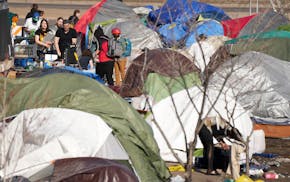Opinion editor's note: Strib Voices publishes a mix of guest commentaries online and in print each day. To contribute, click here.
•••
Minneapolis is turning the corner. We're not driving people experiencing unsheltered homelessness into the shadows. We're actively seeking them out to offer support, resources and, above all, compassion. And it's working.
No one should be forced to sleep outdoors in spaces not fit for human habitation — without a bed, a restroom or access to basic needs. That is unacceptable in Minneapolis, and it's why we have taken decisive, compassionate action to connect people experiencing homelessness with the shelter, housing and services they need. Encampments are not the answer. Housing is. And it takes a lot of effort to get there.
It starts with our very first interactions — whether in encampments, on the streets, in doorways, by riverbanks or in other tucked-away spaces. We walk alongside each person until they are ready to make the conscious decision to accept shelter or housing services.
This doesn't happen overnight. Trust takes time, persistence and energy. We get to know the people experiencing unsheltered homelessness, and they know us when our teams visit. We notice when someone is not present in their usual spot or when they've moved somewhere else. Five days a week, we listen to their stories, sometimes over a cup of coffee. We don't always know the reasons that people are living on the street, but contributing factors are often mental and physical health, poverty, addiction, trauma or lack of affordable housing.
Over the past several months, Minneapolis has made significant progress. We've worked hand-in-hand with Hennepin County and community partners to expand shelter access, increase housing options, provide addiction services and build trust through more outreach than ever before. We also partner with the Minnesota Indian Women's Resource Center that offers culturally responsive pathways out of homelessness.
The approach is working. Since the end of July 2024 through mid-March, the city helped approximately 270 people accept offers to connect to shelter and temporary housing options in partnership with Hennepin County. In fact, thanks to the county's efforts, more than 2,500 individuals exited homelessness and moved into permanent housing in 2024 alone.
Just months ago, large-scale encampments housed upwards of 100 people at a given time. Today, the largest known encampment in Minneapolis has fewer than 10 people. Recently there were 21 micro-encampments (one or two people) with a total of 35 people experiencing unsheltered homelessness in encampments. Though this number can change daily, it's a huge reduction from the 200 to 300 that existed in past years.
In the second half of 2024 alone, the city of Minneapolis closed 17 encampments — saving lives, protecting municipal resources and giving outreach teams a real chance to intervene early. While this cost over $330,000, the cost of allowing encampments to remain is far greater — not only financially, but emotionally to the people living in them and to neighboring residents and businesses. We've now seen crime dramatically go down near former encampment sites. Calls to 911 and 311 in those areas dropped by 80%. A new special order from Minneapolis Police Chief Brian O'Hara has already prevented at least 19 encampments from forming since January.
One person experiencing unsheltered homelessness is one too many. And yet, these numbers reflect a shift. When we put people at the center of our work, we see results — many people are now in shelter, reunited with family or transitioning into permanent housing. And because of our ongoing partnerships, Minneapolis has reduced unsheltered homelessness by 24% since the pandemic — one of the only major cities in the U.S. to do so.
Let me be clear: There is no simple fix to homelessness. The longer an encampment remains, the harder it becomes to help someone transition into stable, supportive environments where they may thrive, not merely survive. That is why we are acting with urgency and compassion — closing encampments, preventing new ones and continuing to invest in long-term solutions.
In the end, we need to see the humanity in our unhoused neighbors, help them find pathways to success and recognize that every person deserves a safe place to sleep. If we come together as a community, we can all ensure support is available, housing is accessible and no one is left behind.
Enrique Velazquez is director of regulatory services for the city of Minneapolis, charged with leading the city's unsheltered homeless response.
Vang: Stars, stripes and side-eye abroad
Opinion: A $21,000 crime, a diversion deal, and a justice system off the rails
Opinion: Trade policy isn't giving Minnesota's intellectual property the protection it deserves
Readers Write: Tesla vandalism, Hegseth's blunder

